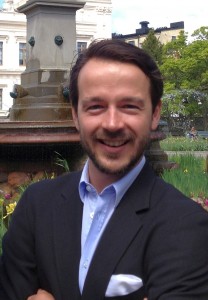They do research without being admitted to doctoral studies. The number of so-called doctoral shadow students has doubled since 2007. This is shown by a questionnaire at Lund University. Lund Doctoral Student Union is worried about the development.
The number of doctoral shadow students has increased at all faculties except at the School of Economics and Management, according to a questionnaire from the evaluation unit at Lund University that was sent out to all postgraduate students registered at doctoral studies fall 2011.
The questionnaire showed a doubling of the number of doctoral students since 2007. The numbers at the Faculty of Medicine and the Faculty of Engineering were the highest where 75 and 40 per cent respectively of the doctoral students said that they had been doctoral shadow students before they started their postgraduate studies.

Florian Sallaba, chairperson of Lund Doctoral Student Union, is worried about the development.
”It is a big problem.” The doctoral shadow students are dependent on their supervisors and have no rights to the result of their research. There could for instance occur situations in which they are denied to authorship articles they themselves have contributed to.”, says Florian Sallaba.
Serious problem
Even the doctoral student ombudsman Aleksandra Popovic takes this problem seriously. There is a grey area between preparatory research courses and doctoral studies, and the difference is not obvious according to the course plans.
There are cases where doctoral students think they have started doctoral studies but they haven’t. She also experiences that there is a permissive attitude towards students starting their doctoral studies without being registered. This becomes a kind of informal probation, but with no guaranteed employment in the future.
”You are either admitted or you’re not, and it is important that the doctoral students are informed about this. Furthermore, it has also to be clear what impact not being registered has.”, says Aleksandra Popovic.
Low scholarships
Within the group of doctoral shadow students the so-called scholarship doctoral students, persons from countries outside the EU who are invited to do research in Sweden, are particularly vulnerable. They live on low scholarships from their native country without any compensation from the university.
The group is in a precarious position, as they, if dismissed from a research project, can lose their residence permit. In the questionnaire there are no indication how many of those answering are foreign scholars and Aleksandra Popovic thinks that the hidden statistics are big.
”Those persons will have an even more problematic situation if they are affected by an accident or if they get sick and don’t have an insurance. It is also more difficult for them to know their rights and how the Swedish system works,” says Aleksandra Popovic.
Temporary jobs after graduation
Anders Axelsson, dean at the Faculty of Engineering, tells us that he was surprised when he came across the result of the questionnaire. He thinks that the high numbers from the Faculty of Engineering depends on the fact that many engineers get a temporary job as a project assistant after graduation.
”This happens when you are waiting for a doctoral position to be vacant, which could be a protracted process. But most of the students get an employment within a semester, either as postgraduate students or on the labor market. As all our employees they also have an insurance.”, says Anders Axelsson.
Established a lowest level
Anders Axelsson is at the same time well aware of the fact that there have been scholarship postgraduate students at the Faculty of Engineering doing research with unreasonably low supply levels.
”Because of that we have established a lowest level for overseas scholarships. We also have established a new program to prevent the occurrence of doctoral shadow students. One part of this is a questionnaire sent out to all postgraduate students mapping the problem at our institutions.” says Anders Axelsson.
Another measure is to prioritize doctoral studies.
”Today doctoral studies are to a greater extent given higher compensation. This leads to a smaller risk that single researchers should accept doctoral shadow students than before,” says Anders Axelsson.
Critical to the mapping
Florian Sallaba thinks that higher grants to doctoral studies is a step in the right direction. He is however critical towards questionnaires as tools to map postgraduate shadow students.
”The present doctoral shadow students are not registered, that is, you can’t reach these with the questionnaires. The most important thing is to inform supervisors and the administration at institution level that it is immoral to deceive doctoral shadow students. A strategy applicable to Lund University is needed. Researchers breaking the rules must be punished.”, says Florian Sallaba.
The Faculty of Medicine chose not to comment on the questionnaire at present.
Text: Karin Furenhed
Translation: Lars Jansson





